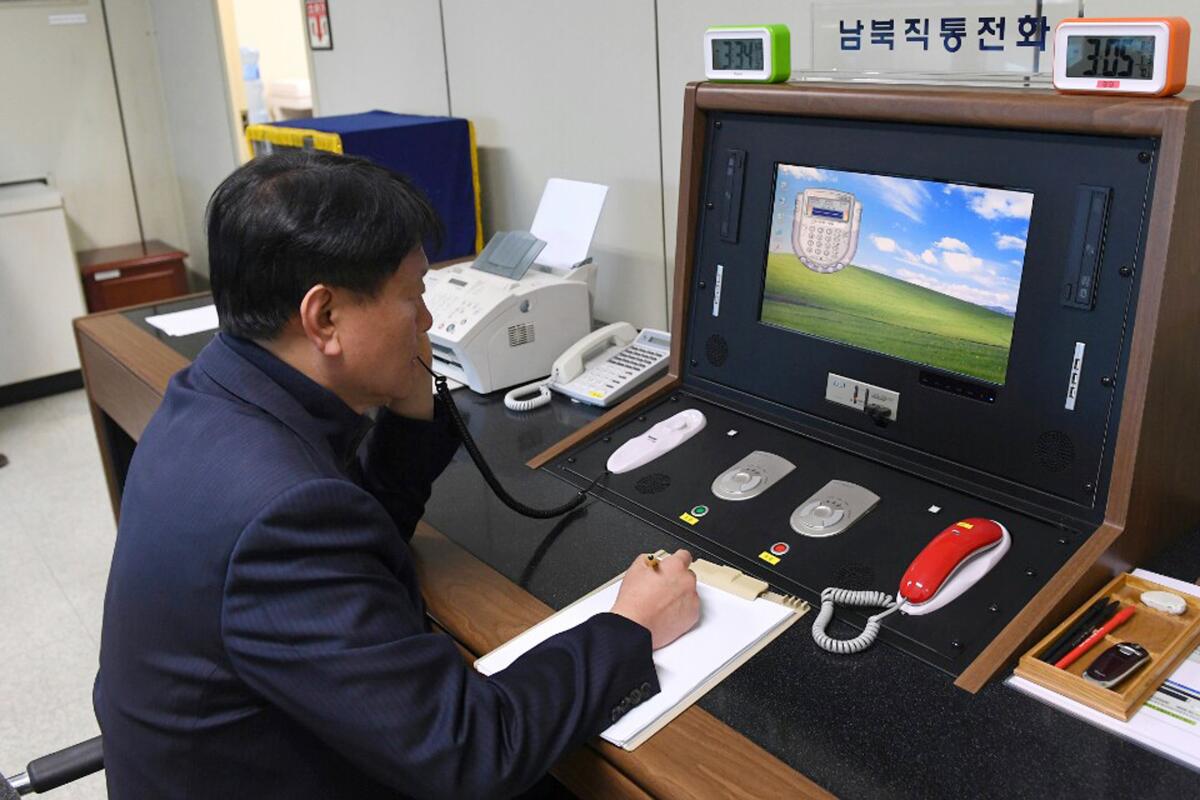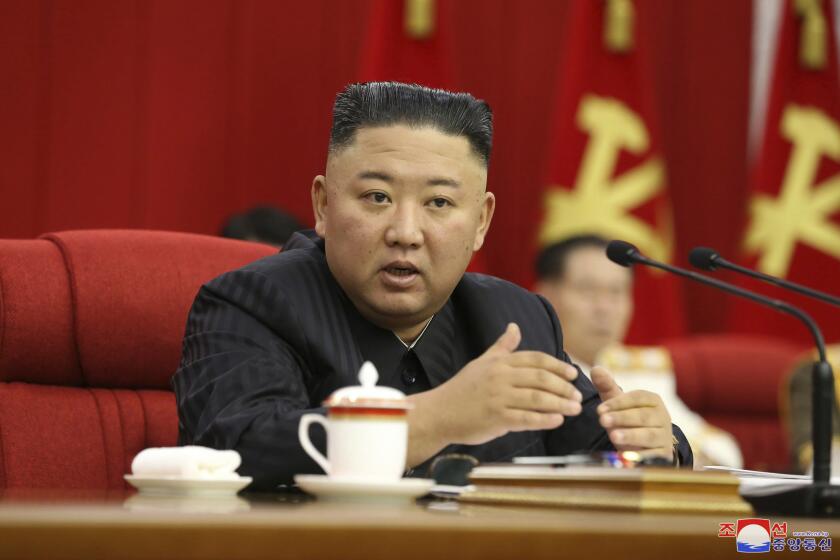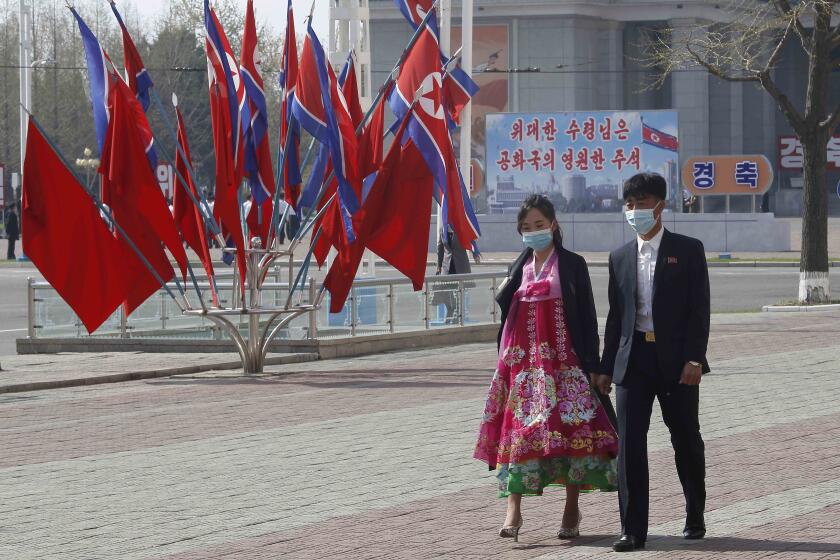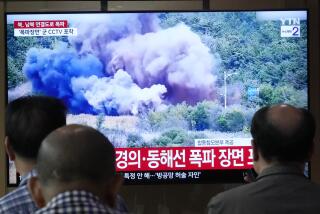Koreas restore communication channels and agree to improve ties

- Share via
SEOUL — The leaders of North and South Korea restored suspended communication channels between them and agreed to improve ties, both governments said Tuesday, amid a 2½ year-stalemate in U.S.-led diplomacy aimed at stripping North Korea of its nuclear weapons.
While the move could certainly help ease animosities on the Korean Peninsula, it’s unclear whether Pyongyang would go as far as to revive previous vigorous cooperation programs with Seoul and get back to the nuclear talks with Washington. Some experts say North Korean leader Kim Jong Un merely intends to burnish his international image or use South Korea as leverage ahead of a potential resumption of talks with the U.S.
Since April, Kim and South Korean President Moon Jae-in exchanged personal letters several times and decided to normalize the cross-border communication channels as a first step toward improving relations, Moon’s office said.
The two leaders agreed to “restore mutual confidence and develop their relationships again as soon as possible,” senior Blue House official Park Soo Hyun said in a televised briefing. Park said the two Koreas subsequently reopened communication channels on Tuesday morning.
North Korea’s state media quickly confirmed the South Korean announcement.
“Now, the whole Korean nation desires to see the North-South relations recovered from setback and stagnation as early as possible,” the official Korean Central News Agency said. “In this regard, the top leaders of the North and the South agreed to make a big stride in recovering the mutual trust and promoting reconciliation by restoring the cutoff inter-Korean communication liaison lines through the recent several exchanges of personal letters.”
Kim Jong Un has ordered his government to be fully prepared for confrontation with the United States over North Korea’s nuclear arsenal.
Last year, North Korea cut off all communication channels with South Korea in protest of what it called South Korea’s failure to stop activists from floating anti-Pyongyang leaflets across their border. An angry North Korea later blew up an empty, South Korean-built liaison office just north of the countries’ border.
Many experts said the North had grown frustrated that Seoul had failed to revive lucrative inter-Korean economic projects and persuade the U.S. to ease international sanctions on the North.
Moon, who espouses greater reconciliation with North Korea, earlier shuttled between Pyongyang and Washington to facilitate a first summit between Kim and then-President Trump. But North Korea abruptly turned a cold shoulder to Moon after a second Kim-Trump summit fell apart in early 2019 due to disputes over U.S.-led sanctions.
Since he took office in January, President Biden’s administration has called on North Korea to return to the talks. But North Korea has insisted it won’t unless the U.S. withdraws its hostile policy against the North, an apparent reference to the sanctions.
Some experts earlier said North Korea may be compelled to reach out to the U.S. or South Korea if its economic difficulties worsen. Mismanagement, storm damage and border shutdowns during the COVID-19 pandemic have further depleted North Korea’s broken economy, and Kim in recent speeches called for his people to brace for prolonged coronavirus restrictions. While his remarks may indicate the potential for a worsening economic situation, outside monitoring groups haven’t seen signs of mass starvation or social chaos in the country of 26 million people.
Nam Sung-wook, a professor at Korea University, said the restoration of the communication channels won’t likely lead to dramatic improvement in ties, such as another Moon-Kim summit.
“North Korea knows it has to sit down for talks with the Biden administration one day. It thinks South Korea still has an effective value ... to make Biden move” in a direction that it favors, Nam said. “North Korea can also build up an [international image] that it’s willing to continue dialogue” with the outside world.
According to Moon’s office, the recent letters exchanged between Moon and Kim didn’t discuss holding a summit or phone talks between them.
After insisting for months that it has had no coronavirus infections, North Korea has come its closest to admitting that that might not be the case.
Park Won Gon, a professor of North Korea studies at Seoul’s Ewha Womans University, said North Korea may intend for steps to help South Korean liberals supporting greater North Korea ties win next March’s presidential elections.
He said it’s unlikely North Korea’s agreement to restore the communication lines meant its pandemic-related difficulties worsened to a level that forced it to reach out to get urgent assistance. He cited reports that North Korea is still refusing to receive aid even from China, its major ally, due to worries that aid deliveries could spread the virus.
After Tuesday’s announcement by their governments, liaison officials from the Koreas had phone conversations via three channels including a military hotline. On two of them, they agreed to talk twice a day as they did in the past, according to Seoul’s unification and defense ministries.
The Koreas remain split along the world’s most heavily fortified border since the 1950-53 Korean War ended in an armistice, not a peace treaty. Tuesday marks the 68h anniversary of the signing of the armistice.
About 28,500 U.S. troops are stationed in South Korea to deter potential aggression from North Korea.
More to Read
Sign up for Essential California
The most important California stories and recommendations in your inbox every morning.
You may occasionally receive promotional content from the Los Angeles Times.















